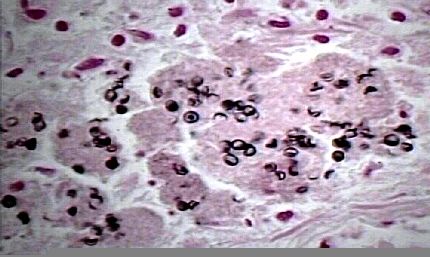In-Depth from Adam pneumococcal bacteria (also called pneumococcus or S. pneumonia) is responsible for many respiratory infections in the upper and lower respiratory tract. This bacterium is dangerous for people with serious chronic illnesses and diseases, and is a major cause of ear infections and sinusitis in children. The most common type of severe infection S. pneumonia is pneumonia. Pneumococcal vaccine protects against some strains of S. pneumonia
bacteria, the most common cause of respiratory infections. There are 2 effective vaccines:
7-valent (strain) conjugated pneumococcal vaccine Prevnar (PCV7) for all infants and children under five years. 23-valent pneumococcal polysaccharide vaccine (Pneumovax, CGP-immune) or PPSV23 for some adults and older children. 7-valent conjugated vaccine Prevnar (PCV7) is very effective in children. The vaccine reduced hospitalizations for pneumonia in children aged 2 to 40%. The vaccine reduced hospitalizations even among adults aged 18 - 39, probably because they are parents of children who might be prone to this disease. Recurrent ear infections in children has decreased by 28% after vaccine. Recommended immunization schedule Prevnar (PCV7) 4 doses at 2, 4, 6, and 12 - 15 months. Children starting immunization between 7 and 11 months strattera no prescritpion should be 3 doses. Children from vaccination of 12 to 23 months only need 2 doses. Those over 2 years old need only 1 dose. Not over two years with heart disease, lung disease (including asthma), kidney disease or are on dialysis, alcoholics, people with diabetes, cirrhosis, or with cochlear implants and cerebrospinal fluid leakage. All people over 65 years, some experts believe that all adults aged 50 - 64 should be vaccinated. Adults over 65 who received pneumococcal polysaccharide vaccine before they are 65 should receive a second dose after turns 65. Adults aged 19 - 64 who smoke should receive one dose of PPV. Persons with conditions that weaken the immune system, such as cancer, HIV or organ transplants
Persons who receive chronic (long) immunosuppressive drugs, including steroids
patients with autoimmune diseases such as rheumatoid arthritis and lupus, although protection may not be as strong for these patients. Older people who have had transplants or with kidney disease may need re-vaccination over 6 years. People living in long-term care facilities. Alaska Native or American Indians aged over 50 who live in areas with high levels of invasive pneumococcal infections. Safety of pneumococcal vaccine was not proven during the first trimester, but there were no side effects reported. When the vaccine for pregnant women, it can protect their children from some respiratory infections. Sealing is more than 6 years in most people, although the protective properties may be lost at a faster rate in the elderly than in young adults. Any risk of serious pneumonia should revaktsynovano 6 years after the first dose, including those who were vaccinated before the age of 65. The following doses of steering, however, is not recommended. Side effects include pain and redness at the injection site, fever, joint pain. Children are more likely to have fever within 48 hours if they receive other vaccines at the same time, and after the second dose. Fortunately, severe reactions are very rare, even if a person mistakenly revaktsynuvaty the consequences of the first vaccination erased. Allergic reactions are very rare. .
